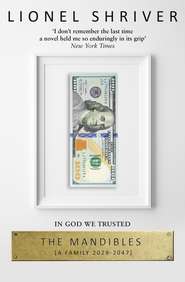По всем вопросам обращайтесь на: info@litportal.ru
(©) 2003-2024.
✖
Big Brother
Автор
Год написания книги
2019
Настройки чтения
Размер шрифта
Высота строк
Поля
I was accustomed to Edison’s catalogue of names that meant nothing to me. Eyes on the road, I could almost hear my brother as he’d always sounded: brash, slick, sure of himself; whatever the disappointments of the present, something lucrative and high profile lay just around the corner. I thought: He’d never sounded fat over the phone.
“Talk to Travis lately?” asked Edison.
Travis Appaloosa sounds made up—since it was. “Dad,” né Hugh Halfdanarson, had assumed his barmy stage name when I was six and Edison nine, too late to sound anything but artificial. So we always called him Travis, with an implicit elbow in the ribs, a get-a-load-of-this. Yet during my childhood and adolescence Travis Appaloosa had lilted with the tuneful familiarity of Bill Bixby, Danny Bonaduce, and Barbara Billingsley. Maybe any sequence of syllables that rings out across the nation every Wednesday at nine simply cannot sound ridiculous. From 1974 to 1982, Travis Appaloosa was part of the landscape, just as Hugh Halfdanarson had always hoped.
“About a month ago,” I said. “He’s obsessed with his website. Have you seen it? There’s a quiz on Joint Custody trivia. A ‘Where Are They Now?’ tab that updates you on whatever drugs Tiffany Kite is currently shooting up—”
“Or which ten-year-old boys Sinclair Vanpelt is shtupping—”
“Though you’d be surprised, Floy Newport is mayor of San Diego.”
“The underestimated one. They’re the ones who sneak up from behind. The devious little fuckers who plot behind your back. Who use the fact that nobody pays any attention to them to bide their time, and then make their move when you least expect it.”
Edison’s tone was playful but needling. Of the three kids in our father’s supposedly cutting-edge one-hour drama, Floy Newport was the closest I had to a doppelgänger, although—oddly, since Edison of all people should know the difference—he was confusing Floy the actress with Maple Fields, the character she played. On Joint Custody, Maple was the middle one, sandwiched between prodigies, eternally unnoticed and not especially good at anything. Whereas Edison had reviled the character he most resembled in the show, Caleb Fields, as much as the vain pretty boy Sinclair Vanpelt who played him, I’d identified with Maple Fields completely.
“On that website,” I said. “Believe it or not, Travis has also listed out the plots of every single episode. In order. Several paragraphs apiece.”
“Talk about time on your hands.”
“Too bad we didn’t video that woman back at the airport for him. ‘Travis Appaloosa’ meant something to her. That’s a dying breed.”
“She was about forty-five? The right age. Probably watched every season. It’s a whole cohort, Panda Bear. They’re not that old, and they’re not all dead yet.”
“Only a few names from the shows you grew up with stick in your head,” I said. “As a rule, Travis’s isn’t one of them.”
“You’d be surprised. You don’t use his surname. I still get asked about the geeze more often than you’d think.”
In point of fact, I had gone by Pandora Appaloosa for a while in college. A little lost, I imagined that if other people thought they knew who I was, then I would know, too. But before long, the very query I was courting—“Any relation to Travis?”—began to seem not only like cheating but counterproductive. My classmates at Reed would only want to hear about my dad the TV star; in contemporary terms, I had reduced myself to a hyperlink to someone else’s Wikipedia page. So I reverted to Halfdanarson when I moved to Iowa. In recent years even fans of retro TV were unlikely to recognize my father’s pseudonym, which disuse was returning to the goofiness that had first sent my mother into peels of laughter. But I was mostly glad of having resumed the ungainly Swedish singsong my father had shed because Halfdanarson was my real name.
I’d usually have savored ragging on our father with Edison, that ritual touching base with our sick, stupid history. I rarely discussed my childhood with Fletcher. I hadn’t even let on that my father had been a television actor in a wildly successful show until months into our relationship, and when I finally let it slip I was relieved to learn that Fletcher hadn’t watched Joint Custody when it was on in prime time. Yet no matter how firmly I’d emphasized that my offbeat upbringing in Tujunga Hills was an arbitrary footnote in a life otherwise ordinary by design, Fletcher always took reference to the program as a pulling of rank, and I avoided the subject. Only with Edison, then, could I access a past that, however loath I was to depend on it for a sense of importance, I was reluctant to jettison completely. It was my past, whatever it meant, the only one I had.
I grew up with a set of parallels that expressed varying degrees of distortion and caricature. I didn’t only have a father named Hugh Halfdanarson, but one who doubled ludicrously as Travis Appaloosa, who played another father named Emory Fields, a fake dad who was a far more successful paterfamilias than the self-absorbed monomaniac I saw only occasionally at home. I wasn’t simply Pandora Halfdanarson, but could choose to be Pandora Appaloosa if I wished, and on Wednesday nights for eight years I recognized an idealized version of myself in Maple Fields, a sweeter and more altruistic little girl than I who was always trying to get her parents back together. In turn, Maple Fields was played by one of those rare child actors who wasn’t unendurable, either on-screen or off-, even if Floy Newport was probably not her real name either. I idolized her and sometimes thought they should have kept filming the show and canceled our real family. So you can see how my fashioning mocking duplicates for a living might have seemed almost inevitable. After all, my favorite episode of Night Gallery was “The Doll.”
This time driving back to New Holland our traditional sharing of notes—first and foremost, on whatever crackpot strategy Travis had recently devised to restore himself as the apple of the public eye—felt diversionary and dishonest. As we continued to discuss the latest on Joy Markle and Tiffany Kite, I could get with the program only so long as I trained my gaze on I-80. Side glances at the unaccountable mass in the passenger seat broke the spell, and it would suddenly seem a bit rich for Edison in this condition to be deriding anyone else for having failed to live up to youthful promise. For that dizzying sorrow on glimpsing the large gentleman in an airport wheelchair had only intensified, and I’d no idea how I would make it through the whole evening to come without falling apart.
chapter four (#ulink_e88ea6f1-290f-518a-98f1-9d1c04946f10)
Calling, “We’re ho-ome!” in the hallway, I tinged the announcement by descending into a minor key, a note of warning that my family would fail to pick up on. Here I’d hoped to present Tanner with a member of his extended family whom he could plausibly “look up to,” but with my brother’s spine compacted two inches Tanner was already too tall. Nothing about being obese diminished Edison’s accomplishments, but I had a feeling that wasn’t the way Tanner would see things.
When Edison trailed me to the kitchen, Fletcher’s face mirrored what my own must have looked like when I turned to my brother’s voice at the airport: that flat smack against plate glass, the shock of having your expectations so thoroughly thwarted. My husband is not an impolite person, but when he looked up from the stove he said absolutely nothing and forgot to close his mouth. Time stretched. He was dying to look at me, but cutting away would have seemed unwelcoming. “Hey,” he said feebly.
“Hey, bro, good to see you, man!” Edison clapped Fletcher’s shoulder and attempted that double handshake up the elbow, but my husband was too dazed to do it right, and they settled on a pat of an embrace. Edison might not have precisely enjoyed this brand of encounter, but he must have had frequent enough experience with meeting someone who’d last seen him at about 165 to have learned to take a compensatory satisfaction in other people’s transparent hypocrisy. They couldn’t say anything, and whatever they said instead was so extravagantly and obviously at odds with what was going through their heads that the disparity must have stirred a sour internal smile.
“Tanner?” I led Edison over to where my stepson slouched at the table, taking in the scene while dawdling at his laptop. I could already read in the twist of his mouth the ruthless description of our new houseguest that he’d post on Facebook. “You remember your uncle Edison?”
“Not really,” said Tanner warily.
“Hell, kid, you’ve really shot up,” said Edison, extending his hand. “Can’t say I’d recognize you on the street, Tan.” Nobody called Tanner “Tan.”
Tanner continued to slouch, so when he extended his arm to limply shake Edison’s hand it was from as far away as possible. “Can’t say I’d recognize you, either, Ed.” Nobody called Edison “Ed.”
“So you’re seventeen? Figure my son Carson’s about your age,” Edison supposed.
Tanner exclaimed, “You don’t even know?”
That’s when Cody filtered into the doorway. With fair flyaway hair and a diffident manner, she was a shy girl, as I had been. Responding to her natural modesty and diligence, I’d tried for years not to show her any partiality over her more arrogant brother. Although no prodigy at the piano, the girl had a precocious sensitivity that would either be the making of her or would doom her for life as an easy mark. This was one of those moments in which she distinguished herself, for her instincts were pitch perfect. Cody took a mere instant to assess the situation, after which she ran to my brother crying, “Hi, Uncle Edison!” and gave him an unreserved hug.
He hugged her back, hard. I wondered how many times recently anyone had held him like that—with joy, with affection, with no trace of distaste. I wished I’d hugged him that way myself.
“So what’s cookin’?” asked Edison, hovering by the stove.
“Ratatouille and shrimp with polenta,” said Fletcher.
“I’m afraid the shrimp are only the frozen supermarket kind,” I said. “It’s the landlocked Midwest, and Fletcher decides the only animal protein he’ll eat is seafood.”
“No prob—smells great!” Edison helped himself to a large nearby jar of peanuts and asked for a beer. I poured him a lager and followed him anxiously to the table. Fletcher had made the dining set, and the chairs all had finely curved arms—between which my brother was not going to fit.
“I’m sure you’re worn out after your trip,” I said hastily, “but you may not be—comfortable in these chairs.” I did a rapid inventory: the living room was furnished with Fletcher’s rigid normal-size-person creations. But one broken-down recliner in the master bedroom was leftover from the days I lived alone; I’d refused to part with an ugly chair so sumptuous for curling up to read. My husband’s confabulations of oak, cedar, and ash were more sensuous for the eye than the ass.
I tried to be offhand about it. Turning off the ratatouille, Fletcher was stoic, Cody eager to help. Once upstairs, my husband and I finally met each other’s eyes. Desperate to talk to him for hours, I could only shake my head in dismay.
“Mom,” Cody whispered as we knelt on one side of the recliner and Fletcher took the other. “What happened to Uncle Edison?”
“I don’t know, sweetie.”
“Is he sick?”
“According to the latest thinking on the subject”—we heaved to a stand—“yes.” Though I was personally unsure how labeling obesity an “illness” got anyone anywhere.
“Does he eat too much?”
“I think so.”
“Why doesn’t he stop?”
“That’s a good question.” We paused at the top of the stairs.
“He makes me sad,” said my stepdaughter.
“Me, too.” I kept my voice steady for her sake. “Very, very sad.”
I was determined not to make a big deal out of this project, but the recliner was heavy, and in order to get it around the turn at the landing we had to tilt the chair on its side. A certain amount of huffing and Fletcher’s barked directions must have leaked to the kitchen. When we lugged in the recliner, Edison was holding forth to Tanner while leaning on the prep island. I felt bad about making him stand so long, which he must have found tiring. The peanuts were finished.
“I’m not dissing Wynton Marsalis,” Edison was opining. “He’s brought in some bread, if nothing else. But the trouble with Wynton is he feeds this whole nostalgia thing, like jazz is over, you hear what I’m sayin’? Like it’s in a museum, under glass. Nothing wrong with keeping the standards alive, so long as you don’t turn the whole field into one big snoring PBS doc. ’Cause it’s still evolving, dig? I mean, you got a certain amount of lost free crap, which the public hates, and drives what few folks do listen to jazz even further into the ass of the past. Cats who blow all freaky don’t appreciate that even Ornette riffed on an underlying structure. But other Post-Bop cats out there are killing. Even some of Miles’s contemporaries are still playing, still innovating: Sonny, Wayne …”
“Talk about ‘ass of the past,’” said Tanner, focused on his keyboard. “What’s with all the ‘cat’ and ‘man’ and ‘dig’? That shit must have been pretty moldy by the time you were a kid.”
“Yo, every profession got its patois,” said Edison.











